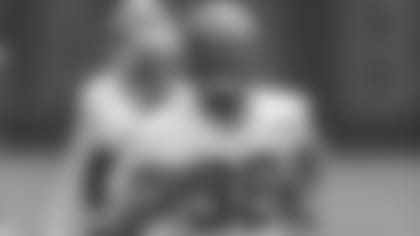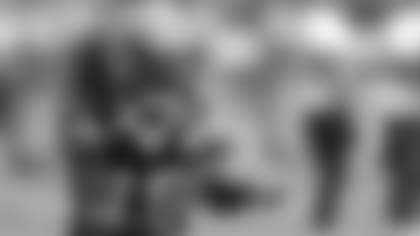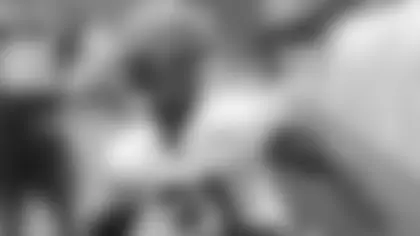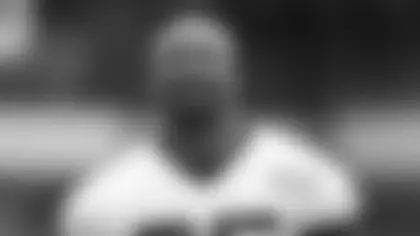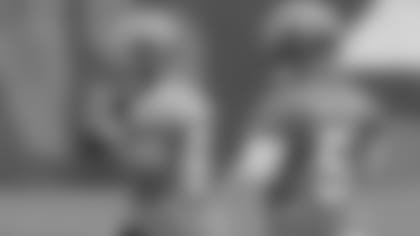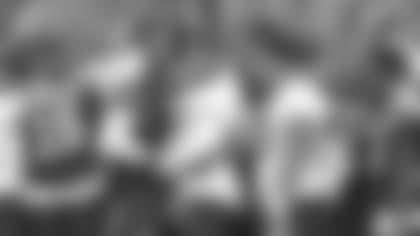Opening statement:
"I certainly understand the interest, but I'm not going to go into a ton of detail about what occurred with Johnny. As we said in our statement, it's a personal matter. We've communicated our concerns with him directly, and I'll keep that between Johnny and us. He knows what's expected of him by the organization as all of our players do. We constantly communicate that – how he's supposed to conduct himself as a player in the building and also how to handle himself outside of the building. What he has done so far this year inside the building as a quarterback has been extremely positive. I've said all along and he knows it that any strides that he made are a direct result of what he's done to improve himself as a person. Proud of the steps he's taken for his personal accountability, how he's handled himself since the start of the offseason. Like I said, he's made huge strides around this building from the time he spent here, the quality of work he's done in the meeting room and on the practice field and on the game field. Certainly, we're not saying that he has it all figured out. It's a process, and we're supporting him through it. Beyond that, I don't think it's really appropriate for me to talk about his personal life, his private life. Those are topics for him to decide if and when he wants to discuss them.
"On the game, after watching the film, the feeling of disappointment is still very much there. Close, but close, as I've said several times, almost winning is called losing. There's some positives to take out of it, but we're in this business to win. It was a great opportunity and we had chances, and we didn't make the plays there in the end. That's the most frustrating thing. We're still very confident in ourselves. No one's hitting the panic button. I think our guys realize how close we are. It's a resilient group. I think we've proven that over time that it's a resilient group. We're going to attack this the only way we know how, learn from it and move onto the next one. Just remind the guys stay focused on their job. We're not going to flinch, but that's a tough one to move on from, knowing how close it was.
"On the injuries, aside from (TE Rob) Housler's hamstring, there's nothing else that is significant. (DB) Joe Haden remains in the concussion protocol, and we'll see how he is over the next couple days."
On respecting QB Johnny Manziel's privacy but noting his actions brought it to the public, specifically regarding his driving potentially endangering himself and others:
"I agree with you. That's why we talk to our guys. We have a security department, and when we get word that our guys are not handling themselves when they leave here appropriately, then we deal with it. I'm just saying as far as divulging details of how we handle personal issues with our players, I just don't think this is the place to do it, but don't think for a second that we're not aware or not concerned, whether its Johnny or whether it's the issue that happened with (DB) Justin (Gilbert) or any of our other players. When guys leave here and they put themselves at risk and other people at risk, that's certainly a concern."
On if deactivating Manziel on Sunday was discussed:
"We took all of the circumstances, we took into account all of the information that we had and made the decision that we made to have him up. That's the decision that we made based on the information we had."
On the difference between Manziel's incident and former Browns offensive line coach Andy Moeller's situation:
"I'm not going to go into the details in comparing the individual incidents. Like I said, this is a personal thing. We've dealt with it – it's not like we've ignored it. We've dealt with it. I just don't think this is the forum to discuss it."
On if the NFL has contacted him about Manziel and concern that there might be league punishment:
"The league gets involved when there are cases like this. I don't know what their timetable is; I don't know the specifics. As with anything that comes up, there's a reporting process you go through, but I just don't know what – I'm not privy to what their details are as far as a timetable."
On justifying not punishing Manziel publicly while one of the 'Play like a Brown' attributes is accountability:
"I'm not of the mindset that all discipline has to be public."
On discipline having to be public to be believed publically:
"To me that has to be – the trust has to be there with the team, and to me, that's my main priority."
On if it is reasonable to assume that physical abuse was not a factor in the incident since Manziel was not suspended:
"Until we had all the information from the police, and when the league concludes their report, we'll have a more total picture of what happened, but given the details that we had, I already said we made our decision based on the information that we had at hand."
On the police report stating Manziel mentioned drinking as it relates to his aftercare, not knowing what his aftercare involves:
"You don't know what his aftercare is."
On if there is a sense of accountability in the situation, given the information that has been released publically and that Manziel spent time in a treatment center:
"There's accountability. Some accountability is public; some of it's private. If you think that we're just turning a cheek to this and ignoring it, you'd be dead wrong."
On if anything has been done or said to Manziel:
"We're in the process of that. Certainly have discussed it with him."
On wanting what's best for Manziel but concern that there may always be a distraction, given Manziel's high profile:
"If you just look at this incident, if it was one of our other players, would it be the center focus of a press conference? He knows it and understands it. That comes with the territory of who he is."
On if Manziel showed any remorse for his actions when they spoke:
"I'm not going go into details of it."
On if the Browns would consider trading Manziel with the deadline approaching:
"I'm not going to discuss any potential roster moves."
On Bill Cowher's comments that the Browns should release Manziel:
"I understand what's out there, but I'm not going to get into the aftermath of this. We're in the process of dealing with it internally. Once the league is involved, we'll make our appropriate decisions from there."
On how much of a distraction the Manziel situation is to him today and to the Browns overall:
"It's certainly there – we're aware of it – but I think it's much more outside of the building than it is internal because I think our guys see how he is when he's here. Yeah, he's involved in an incident and guys are concerned, but at the same time, I don't see it as a huge distraction for our players."
On if the NFL has told the Browns that they are looking into it:
"Again, I don't know their timetable. They set up their own how they handle it, and that is something I am not in the loop on."
On perception that there is no accountability within the Browns locker room and that more needs to be done:
"Wow. We handle discipline in a variety of ways, but our players, we don't publish players getting fined. Those details stay private, but our players get fined often and for a variety of things."
On if the Browns discussed Owner Jimmy Haslam, General Manager Ray Farmer or President Alec Scheiner addressing the media on this incident instead of him:
"No, did not."
On if it is the owner's or GM's job to address this situation:
"We've had discussions. We meet weekly as a management group, and this was a topic of conversation."
On if he is comfortable being the Browns' voice on the situation:
"Am I ever comfortable sitting up here? No. I get it. It's an unfortunate thing, and there's a lot of things going on and you're dealing with somebody's personal life and confidentiality and stuff and some things that have come out that are disturbing. I get it. I get the concern and I get the outcry and I know everything with him is magnified times 1,000. He's made a lot of strides and this is a process for him. I know it's something that's upsetting – it's upsetting for all of us. I don't know how much more I can say on it. I just don't like where we're headed with just because there was no instant, public punishment that all of a sudden there's no accountability in our locker room."
On if Manziel admitting to drinking adds to the level of concern:
"Again, I have talked about this for way too long. The details of his treatment and where he is post-rehab, to me, that's personal and it's private."
On how much the Browns weigh serving as a support structure for Manziel after treatment:
"I think that is one of the positives in his life is football. To give him an outlet – again, it is hard for me to speak on not just him but any player outside of the building because I am not with them – but as his coach, he has been an A when he is here."
On the offensive possession late in the fourth quarter that resulted in a K Travis Coons field goal:
"We were trying to catch them in man coverage and have some crossing action. It was similar to a play that Baltimore, ironically, had run against us last year and scored on from essentially the same part of the field. It is a good man-beater. They did a good job of fighting through the traffic and stopping it."
On not being aggressive as none of the plays targeted the end zone:
"The first play, just because the ball wasn't being thrown in the end zone, if we execute that play right – when it was run against us it was a walk-in. I am not concerned about that the ball not going into the end zone there. The second down play, we thought we had the look that we wanted to run the ball, gained a few yards and they made a play on third down. We had nowhere to go with the ball on third down and ended up having to throw it away. The first-down play to me was certainly schemed up to score, but they did a real nice job defending it."
On if it surprised him that the Broncos went deep after LB Karlos Dansby's interception-return TD and if DB Jordan Poyer took a bad angle:
"I think Jordan, he will tell you that. His angle was – I think he got caught staying on the backside a little bit too long and came a little bit flat and then tried to adjust late and (Broncos WR Emmanuel) Sanders just ran through it. We gave them a lot of looks where we were giving them one-on-one on the outside, and we paid the price for it. Outside of that play, (DB) Tramon (Williams) played extremely well. He gave up some completions in front of him but not a ton of yards after the catch. That was tough. We felt like if we forced them to drive the field that once they were in the red zone, they were 0-3. That one hurt."
On assessing the breakdowns during the Browns possession in overtime:
"The first down play was a toss. They went Cover 0 and brought the safety out of the post. They changed the math on the weak side and ended up with a free guy. We didn't execute the block either at the point of attack. That play really turned the series because you go from first-and-10 at the 35 and you hope you get a positive result. Now, you have a 50/50 down that you gain 5 more yards and you are in field goal range. Second-and-12 and you have to look to get a piece of it back. We ended up giving up the sack and then had to throw it again on third-and-long and gave up another one. I think it was just the domino effect from the negative play on first down, which really funneled into second and third."
On if there was confusion on the Browns' two-point conversion attempt with personnel:
"In our game management notes, you are right there at the cusp of (going for) two or one. Originally, we were going to kick it. The extra-point team was out on the field. Then when they took the time to review it is when we talked through it and talked ourselves into going for two."
On how much discussion there was about running the ball after the offside penalty on the two-point attempt:
"From having prepared for them, they are a Cover 0 team on two-point plays. It is difficult to gain a yard when you have a guy running through every gap and a free hitter sitting behind him to scrape to the ball. That is why we decided to go with the play we went with. They defended it well to their credit."
On how much searching he is doing with defensive coordinator Jim O'Neil and to find combinations on the defensive side of the ball:
"It is kind of come down with the front seven to a committee approach. More packaged based on what personnel we want to have on the field. With having the extra defensive lineman up, we were able to roll those guys inside. Any defensive lineman we have up is going to play. If we have five up, we have five starters. Six up, they are all going to play. I think all their snap counts were close to 20 at least or more. Same with the outside backers. I said this last week: it's hard to be an outside backer and play every single snap. That is another one where we feel we have four guys and we took – I know Krug (LB Paul Kruger) probably ended up with the most reps of all of them. I don't have the snap counts here in front of me. I thought the other three – (LB Barkevious) Mingo, (LB) Armonty (Bryant) and (LB) Nate (Orchard) – were all pretty close."
On if Coons told him his maximum distance for field goals:
"Tabes, every game will tell me the limits based on the direction, based on the wind, based on warmups. He will tell me going towards our tunnel it is the 28(-yard line), going the other way, it is the 30(-yard line). It will change and it could change. Sometimes it is the same. Sometimes it is obviously going to depend on how he warmed up and what the wind conditions are and how we feel about it."
On Coons' range kicking into the west end zone yesterday, specifically in overtime:
"I think it was maybe the 30, maybe the 28. I forget what he told me. In overtime? If we had gained nothing in that drive, we probably would have attempted it in overtime from the 35. You get a chance then to end the game. I know the downside of it, but we felt pretty good about how we were playing defensively. I think at that point in overtime, you probably take a shot at the 50-52 yarder. I thought the wind quieted down as the day went on. I thought it was whipping pretty good early and kind of quieted as the day went on."
On RB Robert Turbin's first game:
"I thought he did some good things. I think you got a glimpse of what he can be – very downhill, very physical, runs angry. It was good for him to get those touches. Probably played a few more plays than we wanted him to. I think he was probably 17-18 plays that he was in there. He did some good things."
On if Turbin would have room to run had he not bobbled the ball on first down in overtime:
"Yeah, I was able to tell. Even if he had caught it clean, he might have gotten back to the line."
On strides with the run defense or seeing the same mistakes:
"We are seeing strides. It is still the frustration of we might have 10 run plays and defend eight of them well for little or no gain, and then we get creased with one. It is usually when multiple guys get a minus – somebody steps under themselves, somebody gets reached, a linebacker buries himself or we miss a tackle – you get multiple minuses and that is what adds up to a chunk run."




